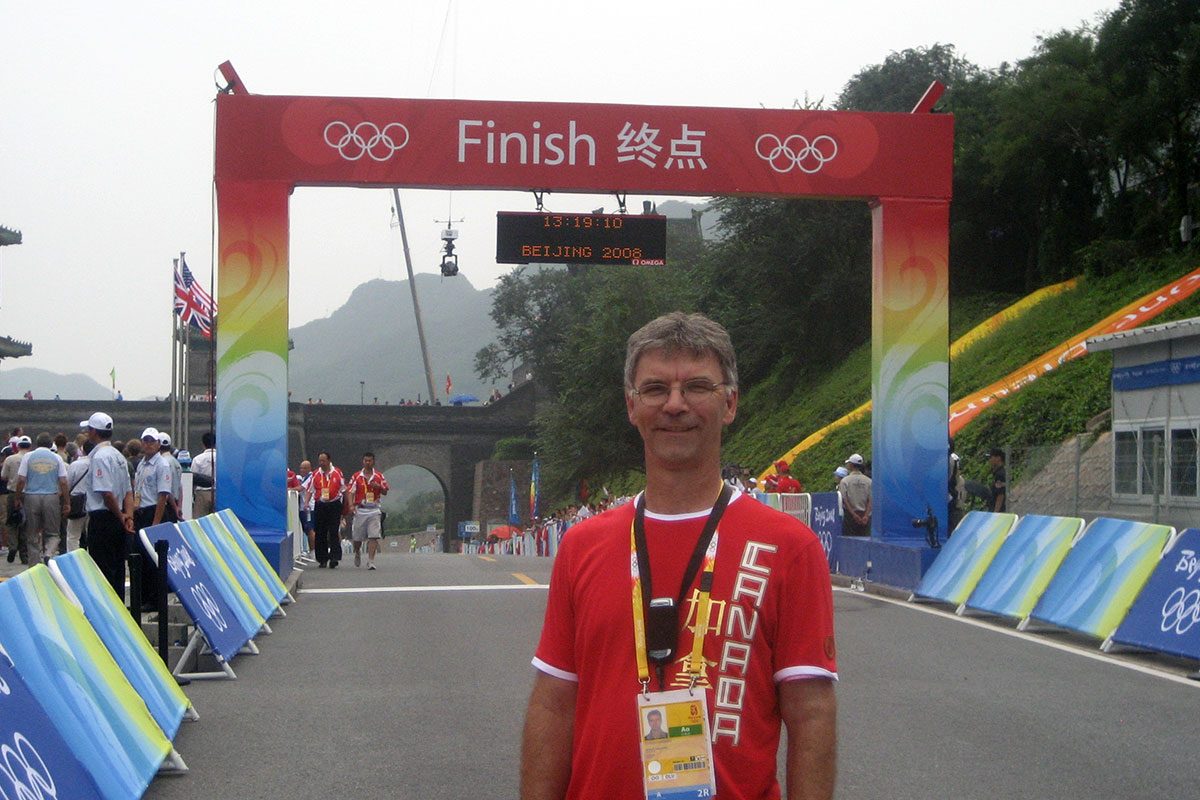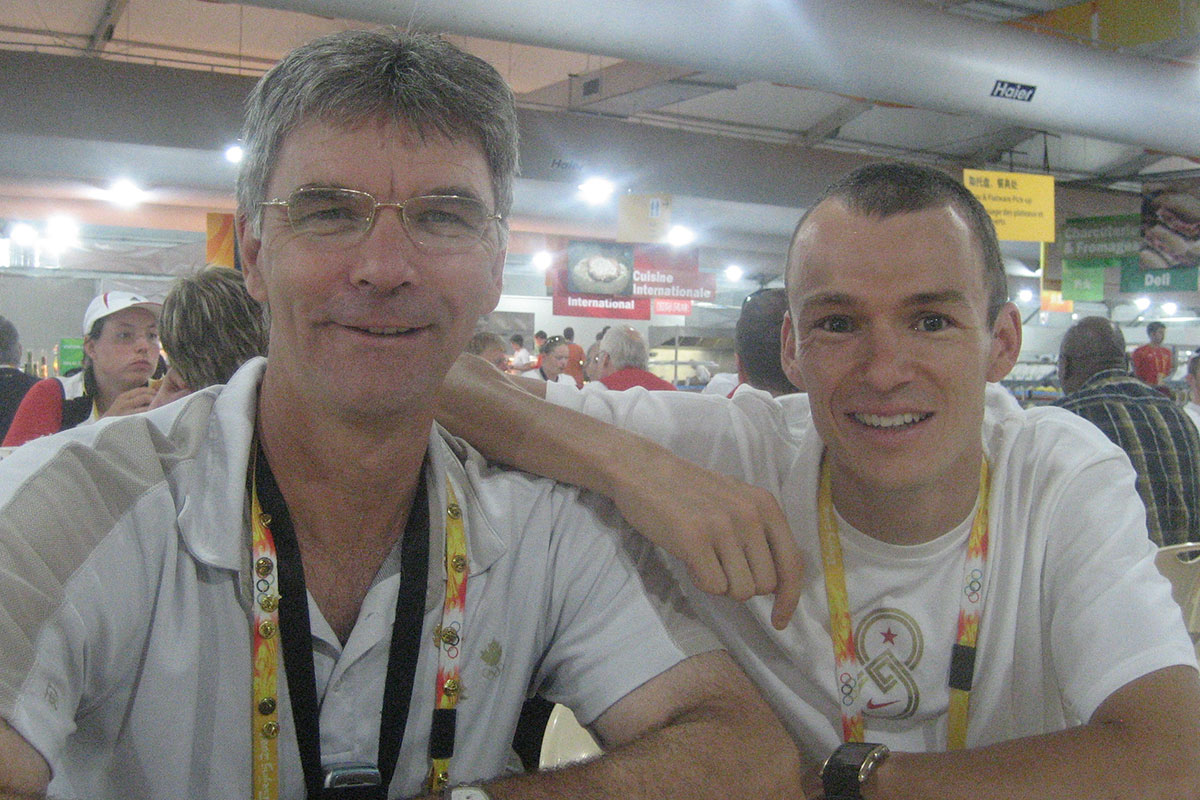
Dr. Glen Bergeron at the finish line for cycling at the 2008 Summer Olympics in Beijing.
The doctor is in (the Olympics)
When Dr. Glen Bergeron attended the Olympic Games, he did so knowing he would never win a medal, but his performance was critical to helping others reach the podium.
An athletic therapist, Bergeron [BPE/73, PhD/93] was a member of the host medical team at the 1976 Winter Olympics in Montreal and the Canadian medical team at four subsequent Games.
His international experience treating Canada’s top athletes has been invaluable to his teaching and research here at home. Bergeron is the U of M’s former Director of Athletic Therapy. He currently leads the Heads Up Concussion Institute at the University of Winnipeg, where he is also a professor in the Gupta Faculty of Kinesiology & Applied Health.
UM Today sat down with Bergeron to talk about life behind-the-scenes at the Olympics.
UM TODAY: HOW DID YOU BECOME INVOLVED WITH THE OLYMPICS?
Bergeron: The first Olympic Games I went to was in Montreal in 1976. I’d just graduated from the Physical Education department at the U of M. Canada was the host country and they needed a lot of people. That was the first time athletic therapy was really involved in the Olympic Games; it was a young profession. I was certified already by that time so that’s how I got my first experience.
YOU PARTICIPATED IN FOUR OLYMPICS AFTER THAT?
Yes, I went to Calgary in 1988, Barcelona in 1992, Sydney in 2000 and Beijing in 2008.
CAN YOU DESCRIBE A TYPICAL DAY?
When you’re on the medical team you get assigned to a particular sport. Usually you’ll get two, sometimes three, sports that you’re assigned to take care of – one you primarily focus on and the others you’re a contact person.
You have two sets of responsibilities: to the team you’re working with and to the clinic. Depending on what’s going with your team you’re going to their practices or games. Then you’re also assigned to the clinic where you see your own athletes and athletes from other sports. You might do two shifts a day, three or four hours each, and then whatever’s happening with your team. It’s about a 15 to 18 hour day. You start at six in the morning and don’t stop until 11 or 12. It’s a very hectic time, but it’s a good time.
IT SOUNDS LIKE YOU’RE REALLY MADE PART OF THE TEAM.
Oh absolutely, you’re right in the inner circle. We probably have more contact with the athletes in terms of spending time with them and treating their injuries. There’s an emotional part to that too: assuring them that their injuries are something they can overcome and they can participate at their optimal level. It’s all that emotion and stories and experiences you have with athletes that are really special.
ARE THERE ANY ATHLETES THAT YOU PARTICULARLY REMEMBER?
One really great experience was working with Dominique Bosshart who was our Manitoban in taekwondo in Sydney. She won the bronze medal and it was a total upset that she won.
We went through the whole media rush that happens after winning a medal. They have to see CBC and then do drug testing so we’re running around like crazy. By the time we got back to the athletes’ village it was about one in the morning and everybody was asleep. She’d just won a bronze medal, and there was nobody there to celebrate!
It happened that there was a bottle of wine in the fridge at the medical clinic so I went in and got it. We sat outside at a little table and had a glass of wine. When we looked up at the sky, we saw the Southern Cross, the Australian constellation. It was an amazing experience. Those kinds of things are fun.

Bergeron hanging out with Canadian triathlete Simon Witfield in the athletes’ village cafeteria in Beijing.
DID ANYTHING ABOUT THE OLYMPICS SURPRISE YOU?
Over time, the Olympics has become much more business-oriented. Many of the athletes now are professional athletes and there’s more considerations, if they get injured, about their career. You have to be very cognizant of that. It puts a different spin on things.
Because there are more opportunities now for athletes to participate professionally, the Olympics has become a showcase for them in terms of their ability to negotiate contract opportunities with other teams. It detracts a bit from the intent of being there – to participate. They’re worrying about participating to negotiate a better contract. There’s more pressure.
I’ve worked at other games, like the World University Games which is about the same size as the Olympics and the competition is just as intense. But the athletes coming in are so wide-eyed and so eager to be there for the sake of being there and being able to play. They come in with a bit more innocence to the whole sport thing.
WAS THERE EVER A TIME WHEN AN ATHLETE WANTED TO COMPETE, DESPITE A BAD INJURY, AND YOU HAD TO TELL THEM THEY COULDN’T?
We definitely have the authority to do that, and those are the hard decisions. You’ve got to say ‘no, you can’t participate’, and that’s very hard to do.
BEYOND THE WORK ASPECT, THE APPEAL OF THE OLYMPICS MUST BE GETTING TO TRAVEL.
Absolutely. You get to interact a lot with host society people, the volunteers, and there’s always some sort of event that you go to that introduces you to the culture.
When I was in Beijing, I was assigned to the cycling team, and road cycling was on the Great Wall of China. For three days in a row that was essentially my office. I’d arrive with my athletes, then they’d go off and train and I’m sitting there for an hour or two while they’re off somewhere on the Great Wall of China. And then during competition, I was riding through the roads along the Wall. How many times do you get to do that?
ONCE IN A LIFETIME, PROBABLY. THAT’S A GREAT MEMORY. DID YOU BRING ANYTHING BACK WITH YOU AS A SOUVENIR?
I’d always hang on to some of our Canadian uniform, but at the end of the Games it’s a trading frenzy. Everyone wants your stuff. Throughout the whole Games everyone’s eying everybody else’s uniforms, saying ‘I want that, and I want that, and that.’
When I went into the athletes’ village after the closing ceremony in Sydney, all the athletes had their uniforms laid out on a blanket in front of their apartments. It was like a big garage sale. You’d walk by and say ‘ok, I’ll give you my shirt for this shirt, or my hat or my duffle bag or backpack’. And you knew whether you had a hot commodity. You’d gauge the value of what you had by how many times people came up to you during the Games and said ‘would you trade that?’
WHAT DO YOU WISH PEOPLE AT HOME KNEW ABOUT THE OLYMPICS?
For most people, this is a once-every-four-year wonder. But to the athletes, they dedicate their lives for that four. They sacrifice so much on a day-by-day basis to train and to have somewhat of a normal life, if they combine it with a job or a family. And they only really get that profile once every four years.
So I think it’s important to really appreciate what goes into that event that you see over the course of two or three weeks.
WHAT DID THE U OF M DO TO HELP SHAPE YOUR PATH TO THE OLYMPICS AND WHERE YOU ARE TODAY?
The U of M is the reason I was introduced to athletic therapy. Gord Mackie was the head athletic therapist and is the person who was my mentor and introduced me to the profession I had no idea existed. He encouraged me to do my post-grad work and was a great role model about how I should be as a professional in this area.
My bachelor’s degree in Physical Education was a real important grounding for me as an athletic therapist. It taught me how to be a teacher. We learned to break down how to do a head stand in progressions, or a forward roll, for example. I do that all the time now when I’m with athletes. We re-introduce skills in small bites to ensure we don’t put the athlete at risk and that we’re constantly developing a level of confidence in that athlete to do a particular skill.
It’s really, really valuable.






